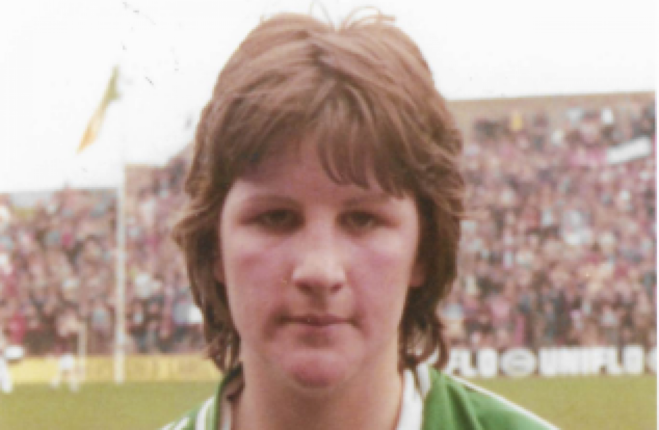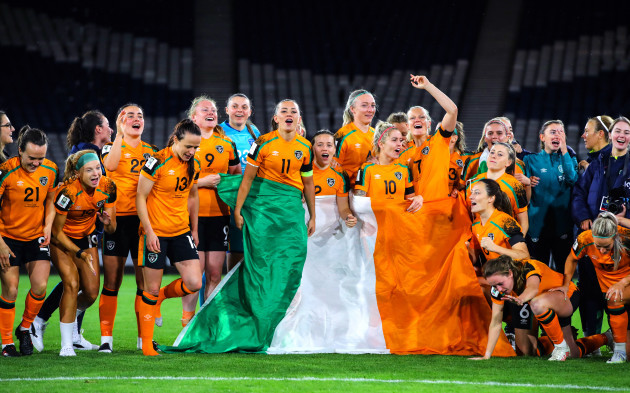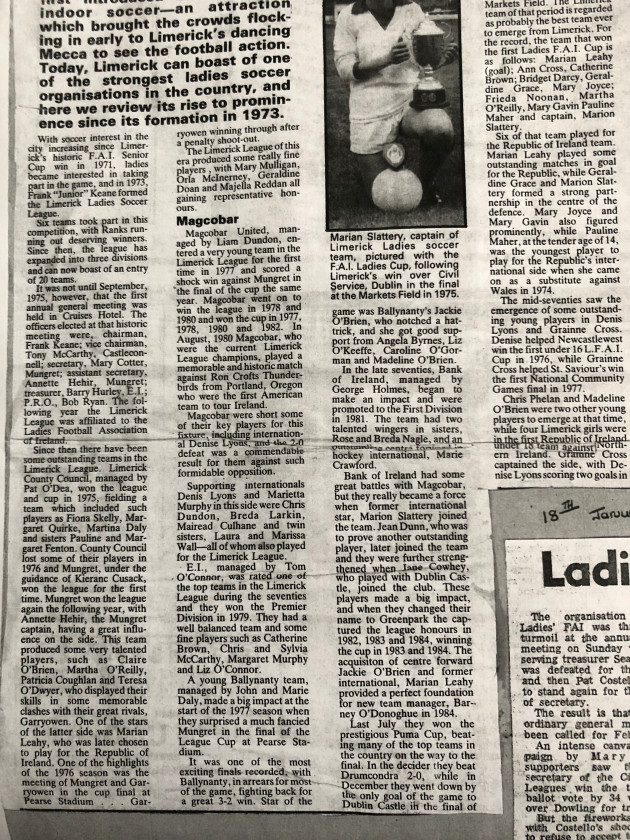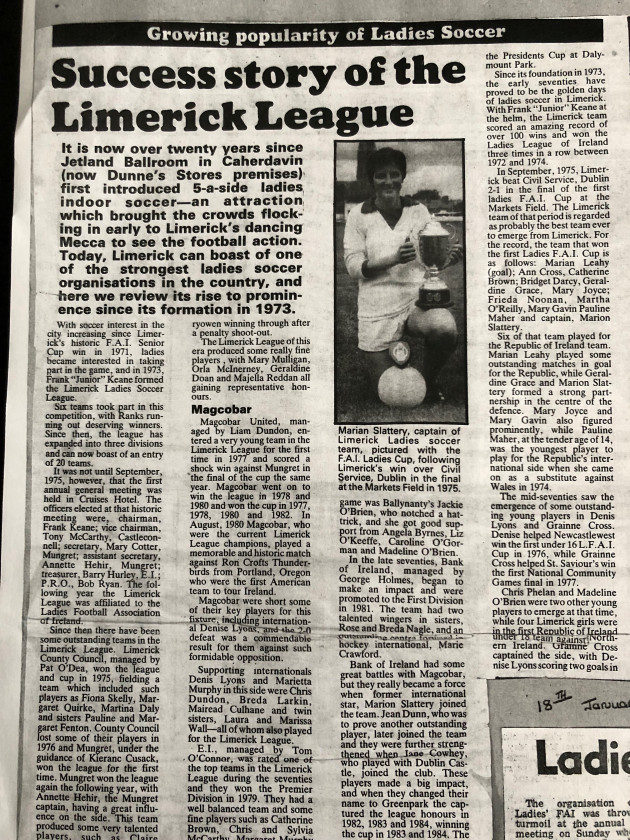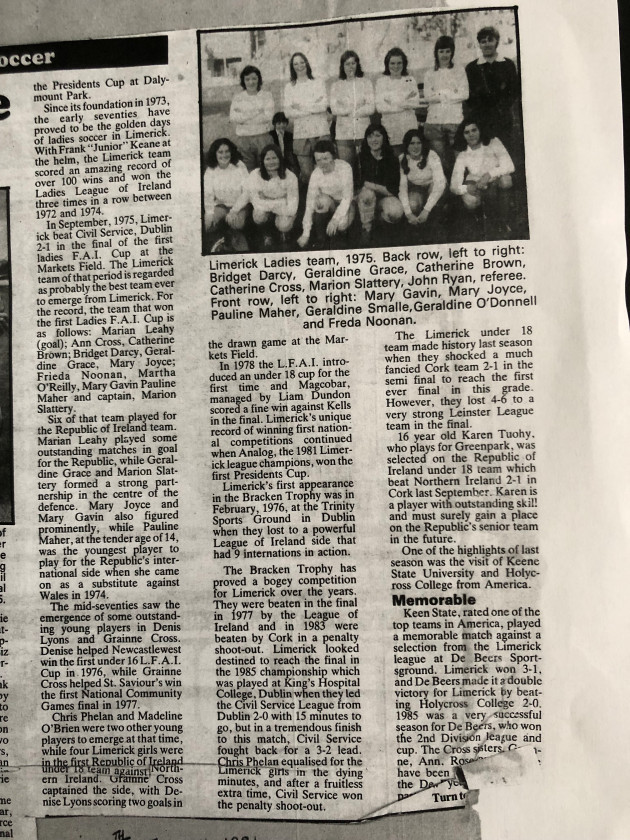YOU COULD justifiably claim that 2022 was the year women’s international football in Ireland peaked.
There are not many achievements that will beat qualifying for the World Cup for the first time ever, short of winning the competition outright, which is a big ask even for a team as accomplished as the one Vera Pauw has put together.
Yet 2022′s seismic feat, stunning Scotland to secure a spot at the tournament in Australia and New Zealand next year, would not have been possible, were it not for the contribution of another group of trailblazing women in 1973.
Limerick native Marion Slattery was part of the Irish set-up in the early days, as they made tentative strides into the world of international football.
A 3-2 win over Wales in 1973, in which Dundalk Ladies’ Paula Gorham hit a hat-trick, was the first officially recognised international match involving an Irish women’s team.
There were, of course, no established pathways to becoming a women’s international footballer in those days, and so Slattery’s rise to prominence was naturally a circuitous one.
“When I was 14 what started me off was I was working in Roches Stores and a girl there by the name of Geraldine Walsh just asked me did I want to come to Garryowen for a kickaround,” she tells The42.
“I was living in Ballynanty at the time. But I loved the game. I just loved the game. I used to play with all the lads on the road growing up. So I said I would. I went up to Garryowen. There was a team in Ballynanty I didn’t know about. We were playing them in our first match and I was in goals for Garryowen.
“We played three games against Ballynanty. We beat them and then they beat us. [Frank] ‘Junior’ Keane was over at Ballynanty. He asked me to play for Ballynanty, so I did. It saved me all the travelling I would have had to do because I would have had to walk miles to play a game — I loved it so much.
“So then [Frank] started up the [Limerick Ladies Soccer League] and we won the Limerick League, we went 100 games unbeaten. We were supposed to go into the Guinness Book of Records but I don’t know what happened at that time.
“But then, the League of Ireland started up, we went into that and we travelled the country every Sunday.
“Then the Irish team came along. I was on the second Irish team in 1973. The first team went to Wales. Then they came back and they asked me to come on the team. We did and we went to Llanelli. We beat them 3-2.”
As with many top players in the sport from that era, in particular, Slattery cultivated her love of football by playing on the streets as a youngster.
“I just loved it, loved the game. I was playing on the streets, with the gates for goals like everybody did.
“When the team started, it was brilliant. I couldn’t believe there was an actual team — playing for a team under a manager was brilliant.”
Slattery initially made her name as a goalscoring centre-forward before a coach recommended a switch to centre-back, which is where she played at international level.
She won 10 caps playing for her country, which is not a huge number by modern standards, but is especially impressive when you consider there were usually only two or three Ireland matches a year during that era. Consequently, Slattery was a relatively regular presence in the side between her first match in 1973 and a final cap versus Northern Ireland in 1980.
“I only got my cap from 1973 seven years ago. My daughter fought for it. I’d given up,” she adds.
“I was after getting married in 1977 so I ended up being pregnant in 1978 and I couldn’t go to England [for a match]. Two of the other girls on the team were pregnant and they went, just to get the trip. I was supposed to go to England but I couldn’t because of the baby. I was going mad. That was the only game I missed
“You had to do everything yourself. I’d left Roches Stores and went to Danus. Danus sponsored us for a game, which was brilliant.”
For those unfamiliar, Danus was a clothing factory. Despite the full-time job, however, Slattery — as with many of her generation hampered by the financial limitations of the sport — took every chance she could get to develop as a footballer.
“On the dinner break from work in the factory, I used to play with the men. My friend said the same about Waterford. A lot of the girls worked for Waterford Glass. They played during a dinner break with the lads as well.
“You travelled around the country — Dublin, Kilkenny, Waterford, Cork. We went to Dundalk many times, up and down one day, in a Volkswagen. There were half of us in the Volkswagen, it was horrendous taking the seats out. We used to play a match and come back down home. We didn’t care, we were doing it for years, and it was brilliant. Even when I got married, I went to Dublin and met up with some of the girls up there. It was crazy when you think about it compared to now.
“The other week, we went down to Waterford. We talk about the same thing every time we meet, saying a lot of things about those days: ‘God, they were great.’”
She continues: “Our manager had a shop. We used to sit in the waiting room, it drove him mad, [us waiting] to go training. There was a green just in front of the shop. Brilliant, it was. I can’t believe there’s somebody talking to me about it. I’m looking at a scrapbook saying: ‘Oh my God, look at those photos.’”
Slattery doesn’t wish to sugarcoat the experience though — there were some difficult moments too inevitably.
“It was very tough as well. When you were dropped, you were disappointed, you were upset about it.”
With Ireland not competing in their first qualifying match until 1982, Slattery also missed out on competitive international football.
“You just played the matches,” she recalls. “It’s not like now, going to the European Championships and all that. I’d have loved it if that was going on.”
Nonetheless, she is still extremely grateful at being part of a select few people to have represented their country in international sport.
“Just playing with all the crowd and going over and playing the matches [was great]. It was Scotland and Wales that we played against mostly. I never got to play against England. But they were the only ones that had teams.”
In terms of role models, Slattery was a big fan of the great Leeds men’s sides in the 1960s and ’70s.
There were women she looked up to as well, citing Margaret O’Connell and the late Anne O’Brien among the best players she encountered.
O’Brien in particular is fondly remembered in footballing circles as she was the first Irish female to play professional football outside of Ireland, moving initially to France with Stade de Reims before a stint in Italy with Serie A teams, including Lazio and Trani.
“We used to play against her in the League of Ireland,” says Slattery.
“I only heard in recent years that she died, I couldn’t believe it. I was shocked.
“She was a great player, she had great control of a ball. You’d be looking at her playing and you’d be just mesmerised. Every player had something different as an individual but Anne O’Brien had great control.
“And Mags O’Connell was a lovely footballer. She was nice. We used to travel up from Limerick and of course, we were ‘the rednecks,’ that’s what they called us [she laughs] once you got your place in the Irish team.
“But they were all great, all nice and they fought for everybody. You’d be picked and unfortunately, you only made so much money — probably £11 at the time.
“It was heartbreaking. [Some players] couldn’t go [on away trips] because they didn’t have the money.”
Away from the international scene, Slattery had great success too. She was part of the Limerick side that beat Dublin’s CSO 2-1 in the first-ever women’s FAI Cup final in 1975, captaining the team to glory.
“Overall, [my highlight] was winning the FAI Cup in the Market’s Field. And they were showing it on the news around the country. We got gear from the sponsors, bits and things that we wore. We called ourselves ‘Leeds United’ because the gear was white.”
Her passion when speaking about that day and her career, in general, remains palpable decades on.
“I have a photograph of [the FAI Cup win] in my kitchen. It’s my pride and joy. I’ve said if the house ever goes on fire, the cap and that photograph have to be taken out first. It just means so much to me, do you know what I mean? I love it, I’m glued to it.”
It was also far from the only accolade Slattery picked up over the course of a distinguished career.
“Oh my God, we won hundreds. We moved house and gave all the trophies out to the kids to get rid of the trophies. It was a good thing. I kept my three League of Ireland medals, my two runners-up medals, and my two FAI Cup medals are inside with my [Ireland] caps — they mean the world to me. You can’t keep the whole lot of them, you have to let them go at some stage.
“I only stopped playing 10 years ago. I’m 68 now. I said ‘jeez, I’ll have to give it up, I’m falling apart’. Then a few of us started playing indoor. We all played together and we used to be killing each other. I said: ‘Jeez, I’ll have to give it up, we’re going to kill each other.’ But I was playing it for years and years. They did a testimonial for me and after that, I packed it in.
“Fran Rooney arranged the testimonial. We had a Limerick selection against the Irish selection at the time. They slaughtered us, but it was just fun. That was on 26 September 1997, would you believe it?”
But more important than the countless medals and trophies won were the memories formed and friendships forged, many of which remain strong to this day.
“All the girls in Limerick, I’d be friendly with. There’s a girl I started off training with when I was 14, she was only 12. And she was my bridesmaid getting married. And she stood for my youngest daughter Tina. We went down to Waterford and got friendly with the Waterford crowd down there.
“And every time I’m off from work I go down to Waterford to see them.
“And everybody I spoke to loved it. And they’d love to do it all over again. They’re all crippled with arthritis at the moment. But I would do it all over again, I wouldn’t care, it was fantastic.
“And we’re all grandmothers now, it’s mad really when you think about it.”
Slattery remains an avid watcher of both the men’s and women’s Irish teams. She will often phone fellow former players afterwards to discuss the games.
She admits there is a degree of envy at how well the Irish players get taken care of now in contrast with her day, but the former footballer suggests the lack of professionalism back then was only a minor inconvenience in the general scheme of things.
“[The current internationals are] looked after and everything. I mean, we travelled, and we got washed and watered at the side of the pitch. I suppose the fellas did as well. There were no dressing rooms or anything like that, but we didn’t care. We didn’t see it, do you know what I mean? All we wanted to do was play. We’d have stayed out all day and all night playing. We’d never have come home.”
Slattery is also well aware of the historical significance of being part of the early Irish teams and paving the way for the present generation’s unprecedented success.
“We started all that really, ladies’ soccer. I know it might not look like it but we did because we were the very first. Waterford and Cork — we realised they had teams down there. We all kind of got in touch with each other and we realised teams wanted a friendly game and then we said we’d start a League of Ireland. We used to go up to Dublin to the CIE Club once a month.
“Kevin Gaynor used to come up from Dundalk. He was secretary and he started up the league.
“So I think we started off all that for the ladies’ soccer here and all around Ireland.
“And it’s about time, I’m delighted for them [qualifying for the World Cup]. I am thrilled, it’s brilliant. We’re delighted to see the players now, the recognition that they’re getting.”
Unfortunately, coaching at the top level was never really feasible in Slattery’s eyes, explaining that raising her kids made it difficult while it is still only relatively recently that the idea of a woman being able to have a sustainable, long-term career on the sidelines became a realistic prospect.
“I’m too old for the coaching side of it now,” she reflects. “When all that came around, when the opportunities were there, it was too late for a lot of us.”
And does Slattery miss the day-to-day involvement in football now?
“I do, yeah. I’ll be out in the back here kicking the ball and I say [to myself]: ‘Jeez, look at you, kicking it against the wall.’”
